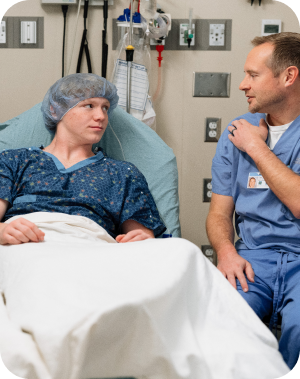endocrinology clinic
Dayton Children’s endocrinology team cares for children with endocrine conditions, including growth disorders, thyroid disease, and others.

comprehensive, multidisciplinary care at the Dayton Children’s endocrinology clinic

Our physician-led team of health professionals provides comprehensive, multidisciplinary care to help diagnose, treat and manage disorders of the endocrine system. These can include growth disorders, thyroid diseases, adrenal diseases and pituitary gland disorders, among others.
In most cases, patients who are part of our endocrinology clinic receive outpatient care only, although on rare occasions a hospital stay is necessary. The endocrinology clinic team cares for patients as they transition into adulthood.
If testing, support services or an appointment with another specialist at Dayton Children’s is needed at any time, our team will help make the necessary arrangements. Our clinic also serves as a resource for primary care physicians and school nurses who need information about the patient’s condition and treatment plan.
Patients and families appreciate our thorough and personal approach, knowing they will see the same endocrinologist at each visit and can contact us by phone or email with questions or concerns.
care for a wide range of endocrine conditions
The endocrinology clinic at Dayton Children’s provides care for patients who have an endocrine disorder other than type 1 or type 2 diabetes. The clinic also cares for those who have been diagnosed with an unrelated condition that affects their endocrine system. For instance, some genetic disorders —such as Prader-Willi syndrome—are not directly related to the endocrine system, but they can cause hormonal changes that require medical attention.
Specialists at Dayton Children’s treat a wide range of endocrine conditions, including:
- Adrenal disorders, such as congenital adrenal hyperplasia and Addison’s disease
- Pituitary disorders
- Growth disorders, including short stature, growth hormone deficiency, SGA (small for gestational age) and failure to thrive
- Disorders of sexual development, such as delayed and precocious puberty, gynecomastia, ambiguous genitalia and gonadal dysfunction
- Polycystic ovarian disorder
- Hyperinsulinism metabolic syndrome (pre-diabetes)
- Diabetes insipidis
- Thyroid disorders, including Graves’ disease, Hashimoto’s thyroiditis and congenital hypothyroidism
- Calcium disorders including vitamin D deficiency, hypoparathyroidism and hyperparathyroidism
Some of our patients have endocrine problems caused by cancer or cancer treatment. These patients are seen by one of our endocrinologists by appointment in the Dayton Children’s oncology clinic.

In most cases, prediabetes develops in patients who are overweight or gain weight rapidly. They also have other at risk factors such as a family history of diabetes, history of steroid use for asthma, or belonging to certain ethnic group. Patients at risk initially develop high insulin levels known as hyperinsulinism and insulin resistance. In some patients, this causes insulin to either not be secreted properly or not work properly. This can lead to elevations of blood sugars and HgA1C. Persistent elevation of glucose levels causes abnormal HgA1C and leads to progression of diabetes.
what causes prediabetes?
Early changes in blood sugars or A1C in the most cases can be detected and treated, causing resolution of prediabetes and preventing diabetes progression.
after diagnosis and outpatient care
After your child has been diagnosed, he or she will come to the Dayton Children’s endocrinology clinic every three to six months for a check-up. The purpose of this checkup is to monitor growth and development, evaluate how well the therapy is working, monitor for side effects and answer questions.
One of our experienced clinic support staff will check your child’s height, weight and vital signs and ask questions about how your child is doing. Then your child’s endocrinologist will perform a brief physical exam and address any specific concerns. Our endocrinologists spend as much time as necessary with patients and families, always making sure to answer all of their questions.
We also offer appointments with a social worker and dietitian in the clinic as needed. Our social worker can help with concerns such as finding transportation to and from the hospital, filling out insurance forms and providing your child’s school nurse with helpful resources. The dietitian can help families establish a nutrition plan to address problems such as obesity and poor weight gain, which can affect children with an endocrinology disorder.
In between appointments, our endocrinology nurses can work with families to address many concerns—insurance coverage, financial assistance for medications, prescription refills, referrals to other specialists and test results, just to name a few.

contact us
The endocrinology department welcomes phone calls to 937-641-3487 during our normal business hours of 8:00 am to 5:00 pm. After hours, you can dial 937-641-3000 and ask that the endocrinologist on call be paged.
schedule an appointment
Schedule you appointment online by visiting our scheduling page. All follow up appointments will be made during your clinic visit or by calling central scheduling at 937-641-4000.
here when you need us
Whether you’re looking for the right provider, ready to make an appointment, or need care right now—we’re here to help you take the next step with confidence.
